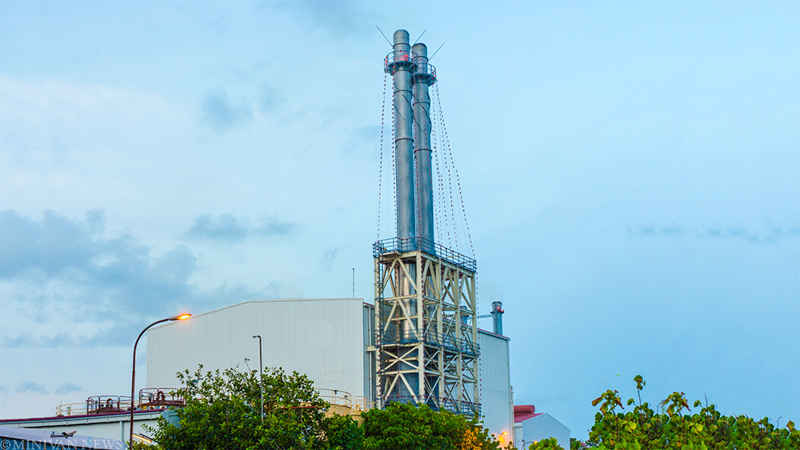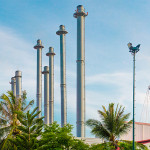The state-owned electricity provider to the atolls says its hands are tied after subsidy cuts last month left more than 5,700 businesses facing millions extra between them in electricity charges.
Companies on three more islands joined growing protests over the subsidy cuts today. Much of the anger is targeted at the state-owned Fenaka Corporation, which provides electricity to the Maldives’ remote islands.
The government previously provided Fenaka with about MVR11 million (US$713,359) a month to subsidise electricity for atoll businesses, it said yesterday, but this cost must now be borne by the companies themselves.
Fenaka Corporation managing director Mohamed Nimal told reporters on Monday that the company was only implementing government policies.
“If the government changes the rules today or categorises special customers and decides to provides subsidies to small businesses, we will bill them at those rates,” he said.
Fenaka has 46,590 meters in 151 islands, of which 5,765 meters were registered as business consumers, Nimal said.
Most shops, cafés and restaurants in the northern hub of Haa Dhaal Kulhuduhfushi were closed in protest over higher electricity bills yesterday, while more than 100 people demonstrated outside the local Fenaka office.
Businessmen protested in Addu City while those in Gaaf Dhaal Thinadhoo and Haa Alif Dhidhoo are planning to boycott paying their bills.
Electricity bills for businesses doubled, and in some case tripled, when the subsidy was discontinued last month.
Nimal said Fenaka could not address the concerns of businessmen across the country as it was “not a regulatory body” or policy maker. The National Social Protection Agency was in charge of issuing subsidies, he added.
Domestic households have also been told to reapply for subsidies before April 9 as part of a shift to targeted subsidies aiming to save the government money.
The government provided about MVR700 million (US$45 million) in subsidies to Fenaka last year, which Nimal said benefited rich and poor alike. This annual expenditure on subsidies is not sustainable, he said.
While shops have reopened in Kulhudhufushi, local media reported today that all shops and cafés have closed in Haa Dhaal Makunudhoo in protest.
Businesses in Fuvahmulah are meanwhile preparing to submit a petition to President Abdulla Yameen, warning of layoffs and price hikes due to a 50 percent rise in electricity bills.
Subsidy
Fenaka officials said bills in Kulhudhufushi are higher than other islands because businesses were charged a much lower rate than the tariff structure approved by the energy authority in 2009, leading to a threefold increase when the subsidy was removed.
While the actual rate was 7.50 laari per unit for usage above 400 units, the now-defunct upper north utility corporation charged 2.75 laari per unit for Kulhudhufushi businesses.
Then-President Dr Mohamed Waheed established Fenaka in 2012 with a mandate to provide electricity, water, and sewerage to island communities after dissolving the provincial utility companies set up by his predecessor.
Meanwhile, despite the price of crude oil falling in the world market, Nimal said Fenaka could not reduce the price of electricity as it was making investments in infrastructure developments and improving service provision.
When the subsidy was introduced, the price of diesel was MVR8 per litre compared with MVR11 per litre at present, he said.
Renewable energy
Dr Ibrahim Nashid, managing director of Renewable Energy Maldives, told Minivan News today that removing subsidies for small businesses could be counterproductive.
As the main consumption of electricity in a small island comes from businesses rather than households, Nashid argued that the island’s economy and Fenaka’s income will be adversely affected if businesses were forced to shut down.
Nashid suggested that “demand side management” policies and “streamlining” high overhead costs of the Fenaka corporation would result in more savings.
At present, small islands have both a powerhouse and a Fenaka office, he noted, calling for the two to be consolidated.
He stressed that a number of other solutions were available in lieu of price hikes, such as investing in solar energy.
“But the solution for a person with a big hammer will be hitting the nail harder when he doesn’t have other tools,” he said.
Producing energy through solar panels is currently cheaper at 25 US cents per hour, he continued, whilst the cost with diesel would be 35 US cents per hour.
Although renewable energy requires a high initial investment, Nashid said there are interested and capable parties in the Maldives.
“In my view, we can provide electricity for everyone at a flat rate of MVR2.50 [per unit],” he said, adding that the technology was available, “viable and economically proven.”
Nashid welcomed the ongoing solar energy projects but criticised their limited scope as well as the government’s “lack of political will” and long-term planning.
 (0)Dislikes
(0)Dislikes (0)
(0)






Dr Nashid is speaking logically based on scientific facts. Unfortunately that's not how a significant majority in the Maldives operate. You can predict the next event in this game.
The "first lady" or some "donor" will come forward and perhaps help with the bills or grant exemptions based on political affiliation, i.e. PPM allegiance. Of course, that's not to be construed as "corruption". No way Jose! That should be viewed as altruism and generosity by the most benevolent rulers that almighty Allah bestowed upon us. If not for these benevolent rulers we will have nothing but coconuts and fish to live on...